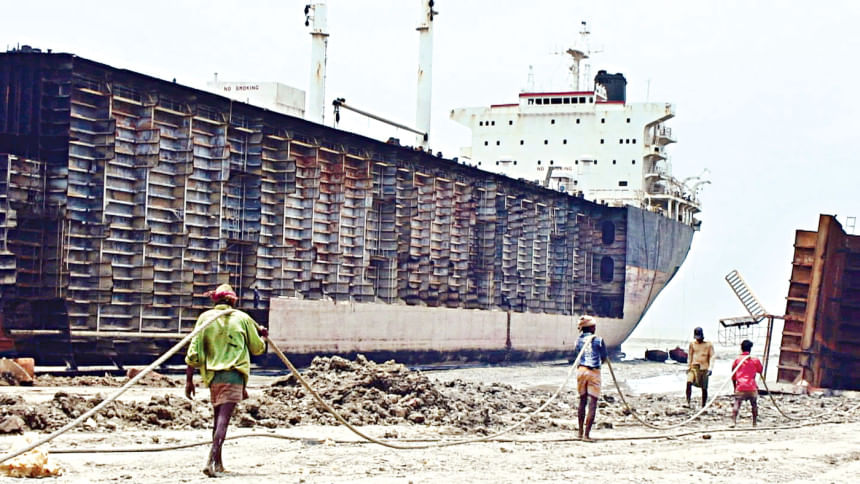Shipbreaking Industry Status: Orange from red; green overlooked

The Department of Environment (DoE) has downgraded the status of the harmful shipbreaking industry in Chattogram from red to orange caving into the pressure from the ship recycling yard owners, in a development that is set to cause serious damage to the ecology in the area.
Recycling of ships is considered the most environmentally-friendly and economically sound way of getting rid of end-of-life vessels.
But the vessels themselves contain hazardous materials in its structure such as asbestos, heavy metals, mineral oil, bilge and ballast water, polycyclic aromati hydrocarbons, polychlorinated biphenyls, sludge oil and organotin, all of which if not disposed of properly are hazardous to both the humans and the environment.
Until the 1970s, ships were mainly dismantled in Europe and the US. As the social and environmental protection laws tightened in those parts of the world, the industry shifted to areas where legal frameworks and enforcement mechanisms are weak, which are the developing countries.
Each year, about 800 ships come to the end of their lives and need to be broken apart and recycled, and about 70 percent of them end up on the beaches of Alang in India, Chattogram in Bangladesh and Gadani in Pakistan.
The yards offer much higher prices for scrap steel by externalising the costs to the environment, workers and local communities in the absence of weak labour and environmental management laws.
The High Court in a judgement in 2009 ordered the authorities not to allow any ships to enter the territory of Bangladesh without a pre-cleaning certificate that will make sure the ships are cleaned of waste.
But a 2010 World Bank study found the presence of lead, chromium, cadmium, mercury, asbestos, heavy metal in the soil of Sitakunda coastal belt where ships are broken.
The study estimated that 79,000 tons of asbestos, 240,000 tons of PCB, 19,78,000 tons of organic liquid waste, 775 tons of inorganic waste and 2,10,000 tons of ozone-depleting substance would be deposited in the soil, water of the Sitakunda coastal belt from 2010 to 2030.
Now, with the downgrading of status by the DoE on October 10, the industry has gotten more latitude to pollute the environment.
When an industry is categorised red, it has the highest obligation to comply with environmental guidelines.
It requires the industry to prepare an Environmental Impact Assessment (EIA) outlining the impact of the industry on soil, water, air and human health.
The EIA is the toughest part of environmental compliance as it sheds light on the potential pollution scenario and an outline of mitigation measures against the pollution scenario.
Industries categorised as orange -- which include factories that make sports equipment, agro-equipment, combs, bread and biscuit -- does not require any EIA, as per the Environment Conservation Regulation-1997, meaning the shipbreaking yard owners no longer have to take stock of the impact their business is having on the environment.
The shipbreaking industry in India and Pakistan are still categorised red.
Contacted Mofidul Alam, director of the DoE's Chattogram (region), told The Daily Star that the change in status would help them provide speedy service to the shipyard owners.
"The owners would now enjoy hassle-free services. But we have to be careful in issuing permission in line with the environmental conservation law," he said without elaborating further.
As per the Environment Conservation Rules-1997, the DoE headquarters reserves the right to issue clearance for an industry categorised as red. The permission and clearance for setting up industry in orange class could be availed from the DoE regional office.
The change has surprised experts who raised questions about the department's intention to enforce environmental laws in shipbreaking yards.
"In no way the DoE can change the status of the industry -- no country in the world that break ships have done this," said Syeda Rizwana Hasan, chief executive of the Bangladesh Environmental Lawyers Association.
Abdullah Al Mamun, vice-president of the Bangladesh Shipbreakers and Recyclers Association, said they have long been seeking the change and finally got it.
Rafiqul Islam Chowdhury, the previous DoE director-general who died in April, had turned down the proposal given the intensity of the industry's pollution.
"Now we will be able to get hassle-free service from the DoE. Earlier, it would take a long time to get permission as well as a plethora of papers," Mamun said.
The shipbreaking yard owners are now focusing more on compliance in a bid to reduce casualty and pollution.
Md Ashraf Uddin, director-general of DoE, could not be reached over the phone for his comment as he was in Glasgow to attend COP-26.

 For all latest news, follow The Daily Star's Google News channel.
For all latest news, follow The Daily Star's Google News channel. 



Comments